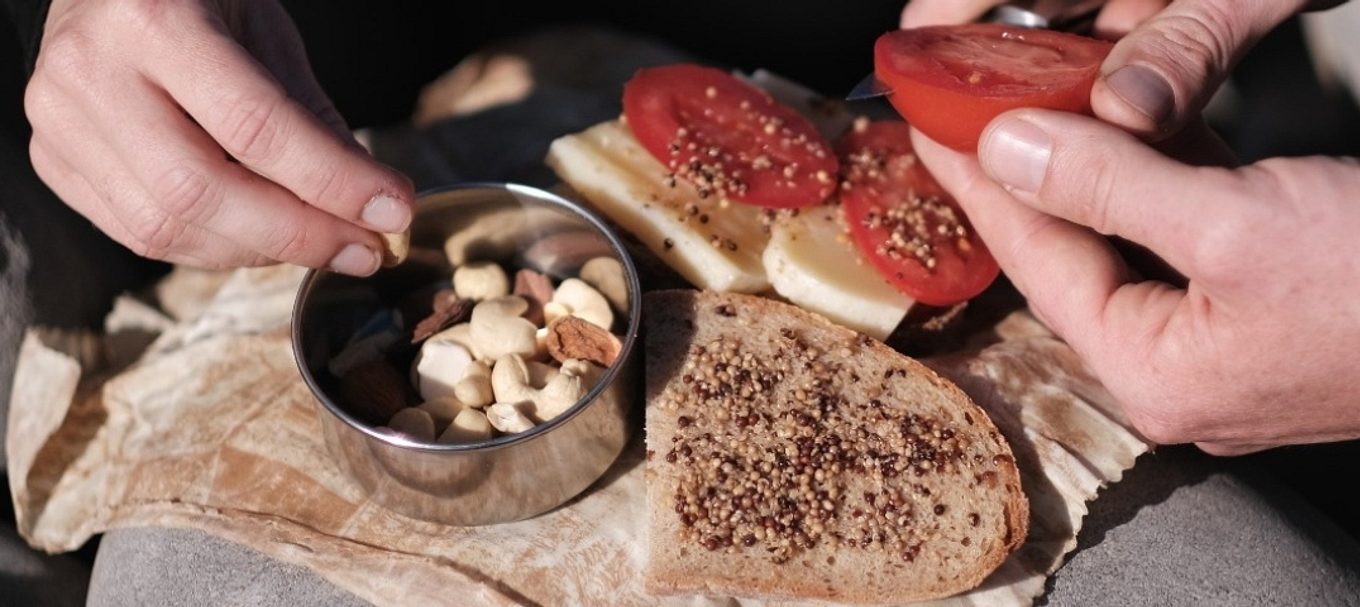
Learn how to reduce plastic food waste on your next hiking or camping trip
We’ve all been there, packing for a day out hiking or a few days camping and wanting to keep things simple and lightweight.
Well that doesn’t have to mean stocking up on a heap of pre-packed snacks and meals wrapped in single-use plastic.
Here are some tips, ideas and recipe suggestions that will make your food and snacks for your next hiking trip lightweight and plastic-reduced.
1. Try your hand at food dehydrating instead of buying prepacked snacks
A lot of hiking food comes pre-packaged. Often it’s freezer-dried with lots of additives and comes in plastic or non-recyclable bags.
These meals have their place when you need a quick and easy lightweight meal. But why not try dehydrating you own food and meals and packing them in eco-friendly containers.
Here are some ideas:
- Dehydrate single food items so you can mix and match them. Things like tomatoes, cauliflower rice, zucchini, grated carrot and mushrooms work well.
- Dehydrate fruit to add flavour to your meals – raspberries, strawberries and mangoes are yummy
- Serve these dehydrated foods with textured vegetable protein, red lentils (they cook quickly), couscous, quinoa and instant polenta.
2. Consider plastic alternatives for food storage
While you don’t want your food to go off or get wet, there are alternatives to plastic bags that can be used for everything from your packed lunches to trail mix. You might like to try:
- calico/cotton food bags
- compostable zip lock bags
- vegetables wrapped in paper
- squeeze tubes or sealed plastic containers for condiments or wet foods. These can be washed and reused when you get home.
3. Be mindful of what you throw out and where
Even if you’ve done your best to minimise your use of single-use plastics and foods with disposable wrappers, you might still find yourself with some rubbish after you’ve eaten.
In national parks, there aren’t any bins so make sure you pack any rubbish away in a bag or container, throw it in your backpack and take it home with you to dispose of.
Don’t ever put rubbish down pit toilets – this isn’t what they’re designed for, and it will be left to the park’s rangers to clean out, which isn’t the best use of their time and expertise!
And while we’re talking waste… Always bury your toilet waste.
Dig a hole about 15 to 20 cm deep, go to the toilet and fill the hole back in with soil. Avoid burying toilet paper – take it home with you in one of your compostable zip lock bags.
When you take your rubbish home you save National Parks and Wildlife Service waste management costs, allowing the team to provide other services highly valued by the community, such as employing information officers and rangers who provide important park information services and maintain parks visitor facilities.
Try these meal ideas
Wondering how to turn these tips and tricks into a menu for your next adventure? Here are some suggestions from our rangers:
Breakfast: Hot or cold porridge – use oats or muesli and milk powder. Put it all in a reusable container and add your delicious dehydrated fruit to the top of your porridge – sure beats those sachet instant versions!
Lunch: Dried biscuits or wraps with salami, parmesan cheese and your dehydrated tomatoes or other vegetables, (chutney, miso, vegemite or peanut butter are great condiments).
Dinner: Lentil curry – red lentils, your favourite curry powder, onion powder, garlic powder, salt, pepper, dehydrated peas, carrot, zucchini and powdered coconut milk. You can put all ingredients into one reusable plastic container or compostable zip lock bag. Have with noodles, instant polenta or cous cous.
Dessert: Apple crumble – dried apples, milk powder, vanilla custard powder, sugar and cinnamon. Put all ingredients into one compostable zip lock bag. Once these ingredients have cooked, sprinkle with oatmeal or ginger nut biscuits.
Send in your bushwalking and camping recipes, we’d love to see the delicious meals that you create while you’re out and about in nature.
You might also like our stories:How to have a low-waste camping trip when it comes to your menu,Everything you need to know for your first camping trip in a national parkandEverything you need to know about cooking on a camping trip.
(Main image courtesy of Folk of all Trades)





